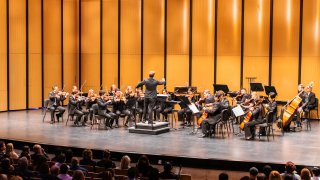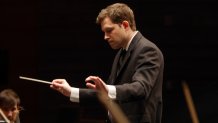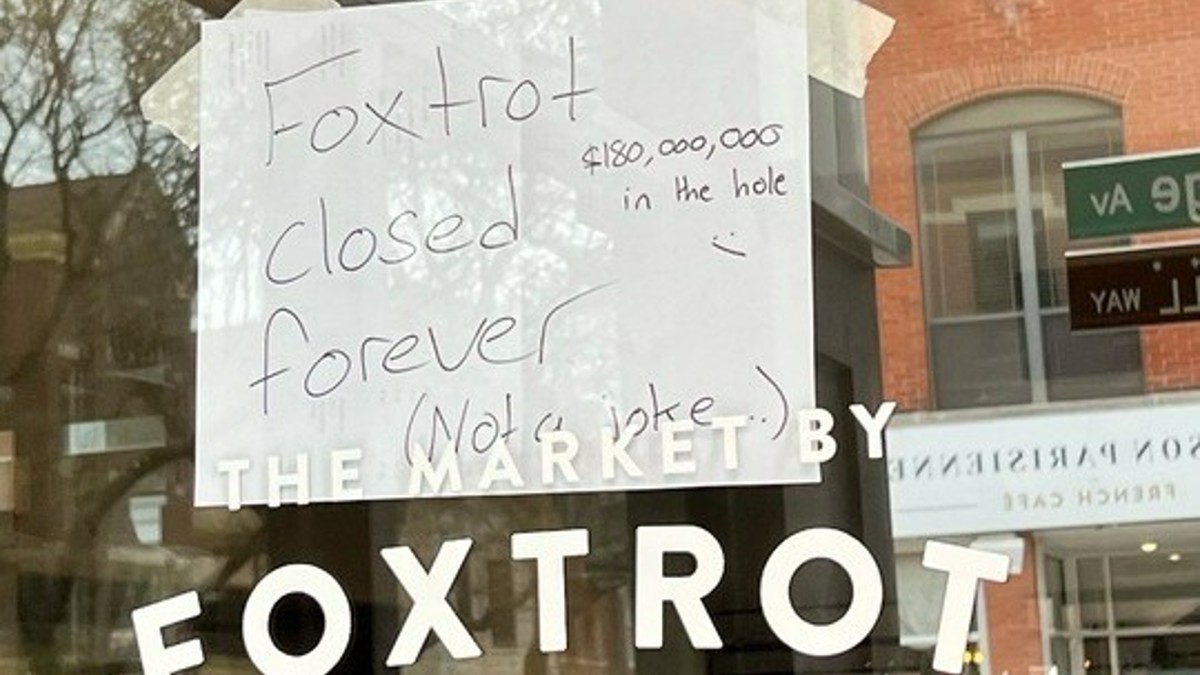
In the middle of winter, Dallas Chamber Symphony’s string musicians bring all four seasons to life with a concert featuring Antonio Vivaldi’s The Four Seasons on February 8 at Moody Performance Hall in the Dallas Arts District.
The second concert of the orchestra’s 2021-2022 season pairs Samuel Barber’s Adagio for Strings and Ralph Vaughan Williams’ Fantasia on a Theme by Thomas Tallis with Vivaldi’s masterpiece to highlight the beauty of the orchestra’s strings.
“We love our strings very much,” said Richard McKay, Dallas Chamber Symphony’s Artistic Director and Conductor. “I thought the three pieces complimented one another really well. They are all Renaissance-inspired works. They have that all in common and they make a nice programmatic arc.”
The orchestra will consist of 29 musicians. “It’s the largest string ensemble we’ve ever used before and that’s because of Vaughan Williams’ Fantasia on a Theme by Thomas Tallis,” McKay said. “If you look at the full score, he has written simultaneously for two independent ensembles plus a quartet that leads orchestra I. What you have is this antiphonal effect between each of the three ensembles throughout that work.”
Get DFW local news, weather forecasts and entertainment stories to your inbox. Sign up for NBC DFW newsletters.

The first half of the concert establishes the Renaissance-inspired sound. “Music in a Renaissance style tends to be modal so that’s the overarching color you get for the first half of the concert. You can get these long, contiguous connected phrases which is truly this element of Renaissance music and a unity of thematic material,” McKay said.
The concert begins with Samuel Barber’s Adagio for Strings. Written in 1936 as the second movement of Barber’s String Quartet, Op. 11, the orchestral piece made its debut on an NBC radio broadcast in 1938, with Arturo Toscanini conducting the NBC Symphony Orchestra. It was played at Franklin Delano Roosevelt’s funeral and has been used in film and television, movingly so in Platoon. “In the case of the Barber, you really get this chant-like Renaissance counterpoint,” McKay said.
The Scene
Vaughan Williams’ Fantasia on a Theme by Thomas Tallis was commissioned by Three Choirs Festival in 1910. Fantasia is based on a tune by a 16th century English composer that caught Vaughan Williams’ attention while he was editing the 1906 English Hymnal. “The source material for the Vaughan Williams [piece] is also Renaissance, Thomas Tallis being a Renaissance composer. Vaughan Williams is very much writing in a way that harkens to a Renaissance style as well,” McKay said.
The second half of the concert is devoted to The Four Seasons, with a fresh interpretation. “With a good ensemble performing Vivaldi’s The Four Seasons, you can experience a tremendous spectrum of how The Four Seasons are interpreted,” McKay said.
McKay explains there is no original manuscript of Vivaldi’s The Four Seasons. “That’s not something that survives. The earliest source we have is an edition published in Amsterdam, of all places, in 1725, which is about a decade or so after it was written,” McKay said.
Since that publication, editors have added various notations and dynamic markings that may or may not represent Vivaldi’s intentions or the performance practices of that era. The Dallas Chamber Symphony opted to use Christopher Hogwood’s critical edition.
“It really removes all of the nonsense editors had added to The Four Seasons over the centuries of publication,” McKay said. “One of the interesting things about doing what we’re doing and working from this critical edition is that it is written out in the parts much more the way they would have written it out in 1725, which means it is not always written in a manner that is at all that consistent with how we write parts today.”

“When we write a piece of music today, we’re going to have all kinds of articulations, dynamic markings in there and we’re going to have helpful notation on how to coordinate the parts like who is playing solo here and who is playing tutti at this other location. These things might have been omitted in the original parts because at that time, performance practices would have been well-known enough by people playing this, they would have just done those intuitively,” McKay said.
McKay and his team have studied how the piece is written to figure out what is solo and what is not. Concertmaster Kazuhiro Takagi is the soloist, and the orchestra will match his stylization, including bowing and dynamics.
The piece will be performed in the traditional sequence, beginning with “Spring” and concluding with McKay’s favorite Vivaldi season. “I’ve always been partial to ‘Winter,’ McKay said. “I’ve liked ‘Summer’ and ‘Winter’ but I give the edge to ‘Winter’ because I think it’s a bit more colorful and the effects that the composer is using. The harmonies are gorgeous, and the solo cello part is beautiful and quite inventive. It’s one of my favorites,” McKay said.

This performance will be as different for musicians who have played The Four Seasons before as it will be for music lovers who have heard it countless times. “We’re confident in what we’ve got, we’re looking forward to doing it, but I guarantee it will be different from anything anyone else has heard,” McKay said.
Learn more: DCSymphony.org/The-Four-Seasons



